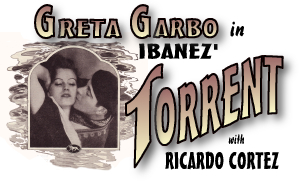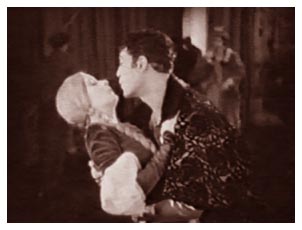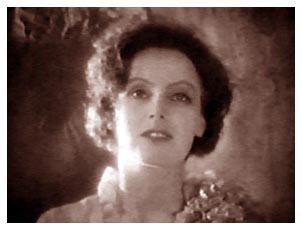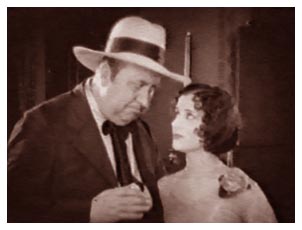

Released February 8, 1926
Metro-Goldwyn Pictures
From the novel by Vicente Blasco Ibanez
Cast: Greta Garbo (Leonora/La Brunna), Ricardo Cortez (Don Rafael Brull), Gertrude Olmsted (Remedios), Edward Connelly (Pedro Moreno), Lucien Littlefield (Cupido), Martha Mattox (Dona Bernarda Brull), Tully Marshall (Don Andres), Mack Swain (Don Mattias), Arthurd Edmund Carew (Salvatti), Lucy Beaumont (Dona Pepa), Lillian Leighton (Isabella), Mario Carillo (King of Spain)
Leonora Moreno and Rafael Brull have grown up together in
a small Spanish village - Rafael from a well-to-do family with
no father and a domineering mother - Leonora from a poor family
living in a home owned by Rafael's family. Rafael's mother does
not approve of his interest in Leonora, and, when the Morenos
fall behind in payments, Rafael's mother uses it as an opportunity
to evict them. She allows Leonora's mother to remain as a housekeeper
in the home, and Leonora and her father leave for Paris hoping
to cash in on her exquisite voice. Giving in to his mother's urging,
Rafael does not even come to see Leonora off on her trip. In Paris,
she becomes the famous diva La Brunna, the toast of Paris and
known throughout Europe - although no one in the little Spanish
village realizes this famous songstress is Leonora. Her father
dies, and, although she has many suitors, she longs to go back
home still maintaining her love for Rafael. Rafael, however, has
continued to submit to his mother's domination becoming engaged
to Remedios and getting elected as deputy. When Leonora returns,
everyone soon learns she is the
famous La Brunna; however, because of the stories about her "affairs,"
Rafael's mother holds even more contempt for her. At first, Leonora
is cool towards Rafael who is still burning from his spineless
acquiescence to his mother's will when she left. However, the
two cannot resist being together. They plan to leave together,
but the next day, Rafael's mother convinces Leonora's mother that
her daughter's lifestyle is a "disgrace." When Leonora
realizes what has happened and that her mother no longer wants
her around, she sends a note to Rafael that she is leaving because
she refuses to "come between a son and his mother."
After being in Madrid for some time, Rafael shows up confessing
his love for Leonora. She is excited and giddy when they decide
to go away together. However, his family's attorney has followed
Rafael to Madrid and convinces him that his actions will kill
his mother. Again, he leaves, and Leonora is heartbroken. It is
many years before they meet again - but has the love survived
the years?
learns she is the
famous La Brunna; however, because of the stories about her "affairs,"
Rafael's mother holds even more contempt for her. At first, Leonora
is cool towards Rafael who is still burning from his spineless
acquiescence to his mother's will when she left. However, the
two cannot resist being together. They plan to leave together,
but the next day, Rafael's mother convinces Leonora's mother that
her daughter's lifestyle is a "disgrace." When Leonora
realizes what has happened and that her mother no longer wants
her around, she sends a note to Rafael that she is leaving because
she refuses to "come between a son and his mother."
After being in Madrid for some time, Rafael shows up confessing
his love for Leonora. She is excited and giddy when they decide
to go away together. However, his family's attorney has followed
Rafael to Madrid and convinces him that his actions will kill
his mother. Again, he leaves, and Leonora is heartbroken. It is
many years before they meet again - but has the love survived
the years?
After viewing the rushes of Garbo's first Hollywood film, Metro-Goldwyn-Mayer head Louis B. Mayer said, "She's got it!" As history shows, his statement was not only accurate, but an understatement considering the legend she created over the next 15 years. Although "Torrent" is not a great film, it does mark a commendable beginning to one of the most famous Hollywood careers of all time.
With film adaptations of his novels including such notables as Rudolph Valentino's "The Four Horsemen of the Apocalypse" (1921) and "Blood and Sand" (1922) and Rex Ingram's "Mare Nostrum" (1926), the Spanish writer Vicente Blasco-Ibanez was highly regarded in Hollywood. Advertised as "Ibanez's Torrent" (to distinguish it from another "Torrent" in theaters at the time), the film's success was no doubt assisted by the author's popularity. Top billing went to the popular Ricardo Cortez, who was a significant draw at the time, rather than the as yet unproven Greta Garbo; however, when audiences saw the film, it was obvious who the real star was.
Ibanez's story is a typical tale of frustrated love. The lovers are forced apart when Leonora leaves with her father to seek a livelihood after they are evicted from their home - and Rafael is convinced by his mother that following her would be a mistake. The rest of the film is a series of "almosts" as they are almost reunited several times but are constantly prevent from doing so. Unfortunately, for Cortez, his spineless character is what keeps getting in the way - which makes it difficult for us to like Rafael Brull. When Leonora and her father are about to leave after being evicted, she sends Rafael a note to come see her before she departs. His mother discovers the note and convinces him that he should not go to her. "She would drag you down - ruin your career! The disgrace would kill me!"
Then, when Leonora returns - now as a famous star, he plans to run away with her. But what about the fiancee he now has - the innocent Remedios (played by another beautiful Swedish actress - Gertrude Olmsted)? He seems to have no guilt about walking away from his betrothal and leaving her behind. When Rafael follows Leonora to Madrid (he apparently said nothing to Remedios), we are pleased (and hopeful) that her patience and devoted love for Rafael will be rewarded as they make plans to go to America together. While Rafael is out finding some orange blossoms (which were plentiful outside the grounds of Leonora's home in the village), she busily packs her things, giddy as a young girl that she and Rafael will now spend their lives together. However, as he is buying orange blossoms, a hand places itself on his shoulder. He turns to see his mother's lawyer, Don Andres (played by the ever capable Tully Marshall). He asks Rafael, "What can this woman do for you but drag you down? You would blast your honor for a woman whose amours are the talk of all Europe? It's not too late, Rafael. Be a man!" Hanging his head in shame, the scene dissolves, and we next see a note delivered to Leonora's room. She takes it almost reluctantly, obviously knowing what is inside the envelope. She opens it, reads it, and her arms fall dejectedly. We do not even see what the note says - it isn't necessary. Once again, Rafael has failed her.
 Born Jacob Krantz in New York,
Cortez was publicized as one of several copies of the "Latin"
lover-type as a result of Valentino's popularity - and who would
carry on the characterization after Valentino's death later that
year. It is hard to imagine that the role of Rafael would have
helped Cortez's career since it is such a weak character - and
one that elicits no sympathy from the viewer. However, his acting
is restrained and very appropriate, especially later in the film
when he is made up with increased girth, graying around the temples,
thick glasses and puffy cheeks to appear older. When sound came
in, the Latin lover type was passé, and Cortez's New York
accent wasn't suited for playing Latin lovers anyway. However,
switching to a character actor, he enjoyed a career well in to
the 1950's playing con men and "shady" types, for the
most part. As would be expected, contemporary reviews were lukewarm
toward his performance in "Torrent." The New York
Times said, "Mr. Cortez acquits himself acceptably,"
and Motion Picture magazine commented, "Ricardo Cortez
is sufficiently Spanish in makeup to pass thru any bull arena."
These two represent the most praise he was able to garner.
Born Jacob Krantz in New York,
Cortez was publicized as one of several copies of the "Latin"
lover-type as a result of Valentino's popularity - and who would
carry on the characterization after Valentino's death later that
year. It is hard to imagine that the role of Rafael would have
helped Cortez's career since it is such a weak character - and
one that elicits no sympathy from the viewer. However, his acting
is restrained and very appropriate, especially later in the film
when he is made up with increased girth, graying around the temples,
thick glasses and puffy cheeks to appear older. When sound came
in, the Latin lover type was passé, and Cortez's New York
accent wasn't suited for playing Latin lovers anyway. However,
switching to a character actor, he enjoyed a career well in to
the 1950's playing con men and "shady" types, for the
most part. As would be expected, contemporary reviews were lukewarm
toward his performance in "Torrent." The New York
Times said, "Mr. Cortez acquits himself acceptably,"
and Motion Picture magazine commented, "Ricardo Cortez
is sufficiently Spanish in makeup to pass thru any bull arena."
These two represent the most praise he was able to garner.
Leonora, however, is a very strong character and one who does elicit sympathy from the viewer - a perfect vehicle for Garbo's first Hollywood production. For the first time on film, we see the real beauty of Garbo come through (her three previous films in Europe failed to bring out the beauty that was revealed in her next 24 appearances). The shadows under the eyes are gone, and the result of some dental work is evident. However, much credit must also be given to cameraman William Daniels in his first of many associations with the reclusive actress. In her book, Greta Garbo: A Life Apart (Scribner, 1997), author Karen Swenson says Daniels empathized with the new actress who spoke very little English and was empathetic toward her because she was "out of her element." "Daniels took great care with her and the effort showed," she said. According to Daniels, "We lit very much to find [an actor's] best features and accent those features strongly. Especially eyes. And Garbo had magnificent eyes. [She also] had natural long eyelashes, and in certain moods, I could throw the light from quite high and show the shadows of the eyelashes come down on the cheeks: it became a sort of trademark with her.'"
As a credit to the MGM make-up department, we see a beauty that was not evident in her early foreign films. When she first appears as La Brunna and is surrounded by suitors, we get our first glimpse on film of the classic beauty that was in a league all its own for the next 15 years - hair, makeup, attire - all a perfect complement to a perfect beauty. As a matter of fact, MGM was so pleased with what they were seeing that, according to Swenson, "The first publicity pictures of Garbo as 'La Brunna' were rushed to national papers before principal photography was even completed."
We see the infectious Garbo laugh for the first time in
a Hollywood film when she returns to the village after becoming
famous. It is evening, and the announcement has just been made
that  Rafael has won the election for
deputy. He is on a platform in the street speaking to the crowd.
Leonora pushes through to the front. When he talks about "honor"
in his speech, Leonora laughs mockingly saying, "Rafael Brull
- the honorable!" It is a fine bit of acting in which we
see the derisiveness of her comment but also the heartache in
her face.
Rafael has won the election for
deputy. He is on a platform in the street speaking to the crowd.
Leonora pushes through to the front. When he talks about "honor"
in his speech, Leonora laughs mockingly saying, "Rafael Brull
- the honorable!" It is a fine bit of acting in which we
see the derisiveness of her comment but also the heartache in
her face.
Orange blossoms provide a theme that carries throughout the story. It is in the romantic orange blossom grove outside her old home that she and Rafael spent much of their time as youths. When she goes to hear Rafael speak, she has an orange blossom in her hand and throws it to him. He quickly puts it inside his coat.
She retreats to her old friend Cupido's barbershop. After the speech, Rafael comes in - he doesn't know where Leonora is, but he is confident Cupido will know. As they talk, Leonora is in the back and begins singing with a record. Leonora moves slowly from behind the wall and, almost nervously, stands where Rafael can see her. It is then that he realizes she is the famous La Brunna. They talk, but she remains emotionally distant, almost taunting him. Rafael is obviously struggling to restrain the emotions he feels at seeing her again. Then, she reaches inside his coat and pulls out the orange blossom. "Still carrying my orange blossoms?" she asks, then adds very matter-of-factly, "But they are dead." The symbolism is not lost on Rafael or the viewer.
Later, Rafael - not yet married - is at a feast in honor of his and Remedios' upcoming marriag - a well-attended affair with many people laughing and enjoying the plentiful food in the courtyard. Rafael is deep in thought about Leonora and begs away from Remedios telling her he has a headache. He goes to the orange blossom grove, apparently to be alone and reminisce. Leonora, who is in the courtyard of her home, walks to the gate and sees him in the grove. She calls to him. He quickly comes to her, and they kiss. "I love you," she tells him. Once again, the orange blossoms are an important part of their relationship.
The film's title is obviously symbolic of both their love and the vicissitudes of their lives - but it also a reference to one sequence in the film when a torrential rain falls on the village causing the dam to burst and flooding to occur. The Brull household being on high ground is the safe refuge to which everyone retreats; however, when Rafael realizes Leonora is still at her old home place and may be in danger, he and Cupido take a small boat and set out on the dangerous journey to her house. As they make their way through the flood, the dam bursts, and a wall of water sweeps them from their boat. They barely make it to the home only to find Leonora comfortably sitting up in bed, totally nonplussed by the commotion. Admittedly, this scene is a bit of a letdown - if not somewhat ridiculous - for it seems to serve no purpose. We must ask ourselves how Rafael could have spent his life in this village thinking Leonora's home was in the path of danger when it apparently was as safe a refuge as his own home. As the New York Times (February 22, 1926) reviewer noted, [The flood sequence] is singularly well done, but part of the action that goes on in Leonora's abode in the small Spanish town causes one to think that the breaking of the dam and the deluge of the water have been grossly exaggerated by the camera." The drama of their efforts to get there made for several minutes of exciting footage - the miniatures of the dam and another house being washed away are admirably done for a pre-computer age. However, it seems to serve no other purpose except to make Rafael look foolish. Variety's review (February 24, 1926) said, "It is evident that the great scene of the waters was counted on to carry the picture, but at this late date, a bursting dam doesn't mean anything in a picture except as an incident."
Ibanez's story is typical melodrama from the period, and
how many times have we seen the poor girl/boy go to the city and
make it big as a singer or other entertainer? The idea of having
lovers parted by circumstances that seem mostly absurd goes back
to the classics such as "Wuthering Heights" (albeit,
much better done in the Emily Bronte novel). Yet, probably because
we are not given the traditional happy ending, Ibanez gives us
a more plausible story that ends on a more acceptable - albeit
sad - note. As the Motion Picture (May 1926) magazine reviewer
observed, "If you admit this is old, you are admitting the
truth, but then on the other hand, it is very well done and its
unconventional ending seeing the hero completely conventionalized
by  marriage into a puffy, stupid man,
being rebuffed by his erstwhile sweetheart, gives it a certain
tang that lifts it up and makes it a work of real substance."
marriage into a puffy, stupid man,
being rebuffed by his erstwhile sweetheart, gives it a certain
tang that lifts it up and makes it a work of real substance."
The early MGM films had a special quality about them that placed them a cut above most other studios' productions, and, although not the best MGM production from 1926, the sets, casting, acting and writing are all well above average in this film - much credit due to director Monta Bell. There is some wry humor appropriately and judiciously placed in the film. For example, former Keystone comedian Mack Swain, as Remedios' father, warns her, "Don't give in to a man before you marry him - or afterward either." In another scene, a couple at one of La Brunna's performances provide a humorous exchange. She: "They say after her father died, Salvatti trained her voice for nothing." He: "Tenors never do anything for nothing. Lucien Littlefield as Cupido, the barber who coached Leonora's singing while she was in the village, also brings some light moments to the story - all done with taste and restraint.
Lovely as she is, Gertrude Olmsted is given a rather small part in the film with nothing to allow her to stand out. We do, however, feel sympathy for her because her devotion to Rafael is obviously not returned - and, as far as we know, she is never aware of his encounters with Leonora. At the end when she and Rafael are beginning to show signs of age, her devotion to her husband is made obvious as she assists Rafael to his chair in front of the fire, removes his shoes, and sits on the floor - lovingly and contentedly - with her head on his knee.
The lack of praise for Cortez is probably a combination of being given a role that doesn't lend itself to praise, and the fact that he is so overshadowed by Garbo. The Picture Play magazine reviewer was obviously taken with her beauty. "[The film] has one very beautiful recommendation. I am speaking of Greta Garbo, who, to my way of thinking, is about the loveliest importation we have had so far." Motion Picture magazine said, "Probably the most important feature of the film is the latest Greta from Sweden. This is the Greta Garbo, a pretty, wistful, and intensely feminine young person who suggests a composite picture of a dozen of our best-known stars. Making her debut in the film, she registers a complete success." Variety gushed, "Greta Garbo, making her American debut as a screen star, might just as well be hailed right here as the find of the year. This girl has everything with looks, acting ability and personality. When one is a Scandinavian and can put over a Latin characterization with sufficient power to make it most convincing, need there be anything more said regarding her ability?"
Although seen on Turner Classic Movies for quite some time,
"Torrent" is now available on DVD from the Warner Brothers
Archives (WBshop.com). Viewing this film is a must if only as
the first Hollywood film of one of the screen's greatest legends
- but it is commendable for Garbo's magnetic performance which
carries the film and makes it a satisfying entertainment experience.
Arthur Barrow's (he was Frank Zappa's bass player) orchestral
score complements each scene perfectly and is one of best commissioned
by TCM. The print is excellent with original tints, although the
tints sometimes are a bit overpowering.
Copyright 2011 by Tim Lussier. All rights reserved.